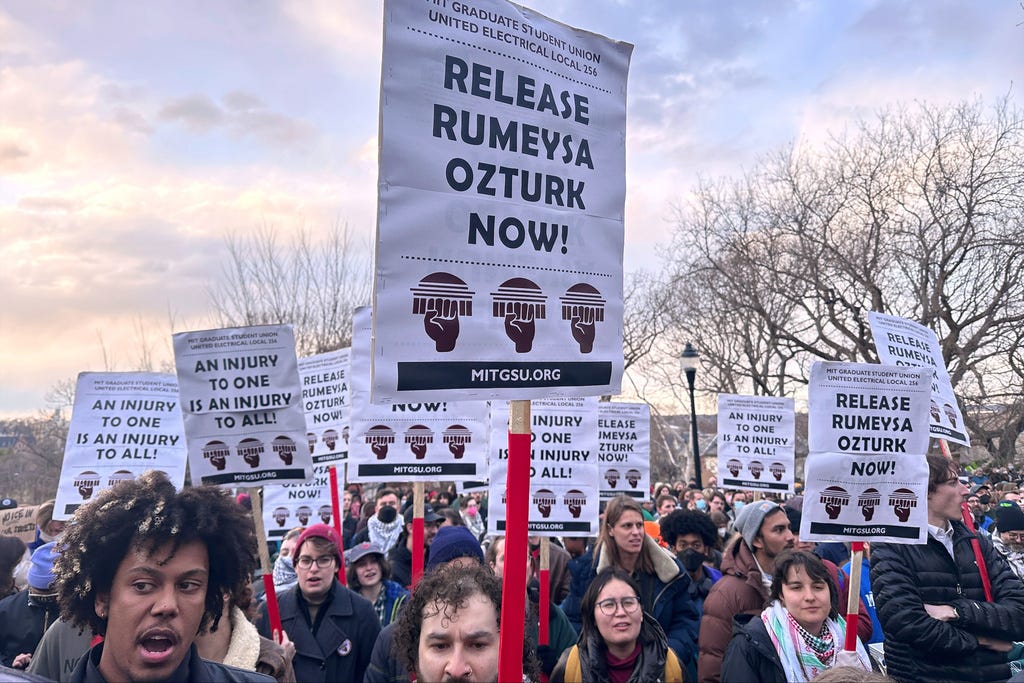Fear and Loathing in Trump’s America
Hunter S. Thompson’s gonzo journalism saw this era of rising American fascism coming, and today’s college campuses are left wondering why no one listened

There is fear and loathing on American college campuses.
But I am not really talking here about Hunter S. Thompson and his ‘gonzo’ journalism which electrified college campuses of my youth in the 1970s and 1980s. Thompson’s first break out piece was written in 1967 for The Nation and it was about the Hells Angels motorcycle gang which he expanded into a paranoid rant that, looking back now, truly feels prescient.
Thompson's “fear and loathing,” which was enshrined in his 1972 Fear and Loathing in Las Vegas, was not a gimmick but a feverish and drug-addled idea that hijacked a generation and flew it straight into a tail spin of surreal visions around a coming age of fascism. These days, it seems, he wasn’t merely a deranged misanthrope after all. In fact, we are now starting to realize that the rise of a uniquely American fascism which Thompson foretold seems to be upon us.
On college campuses from coast to coast and in places in between, you can discern pervasive ‘fear’ as faculty, administrators and students try to navigate unprecedented attacks from Washington on academic freedom, freedom of expression and even press freedom. This is all unfolding, or, unraveling might be a better word choice, amid a spirit in Washington that could fairly be described as ‘loathing’ by the Trump administration as it pursues a no-holds-barred assault on every corner of higher education, particularly coastal elite institutions like Harvard University.
In Trump’s first 100 days as president, he has revoked visas using the immigration nationality act and revoked their status on the Student and Exchange Visitor Information Service, or SEVIS, the web-based system that the Department of Homeland Security uses to track students (although it was later restored after a series of lawsuits;) signed executive orders cracking down on international student protesters and threatened to withhold federal grant money unless schools change their admission, curriculum, and protest policies.
This has created an environment where institutions are preemptively limiting their students' right to protest and where college newspapers are self-censoring. For example, NYU forced law students to renounce their right to protest on campus or be barred from taking their final exams. Meanwhile, The Heights, Boston College’s student newspaper, reported in February that the university censored what pro-Palestinian student protesters could say on their signs and speeches after an 80-day approval process for their on-campus protest.
Much of the fear has been building and then started to spread like a brush fire ever since a spate of cases, including several at Columbia University, targeted student demonstrators who were arrested for protesting Israel’s war in Gaza.
A case from late March that has also sent shockwaves across campuses is the arrest of Rumeysa Ozturk, a 30-year old Turkish national and PhD student at Tufts University. She was snatched off the streets by ICE agents, bundled into a car and taken away without due process after she reportedly authored an article in a student publication that was critical of Israel. She was being held in Louisiana for six weeks, without being charged for any crime, until today a Vermont judge ordered her immediate release.
This hostile environment leaves student journalists trying to work through agonizing debates around how to cover fellow students who are afraid to be quoted for very good reasons. And it comes as college newsrooms are rising in reach and influence, due to the disappearance of other local news sources. Over 25 million readers in the U.S. received their news from student journalists' work published in professional outlets during the 2023-2024 school year.
The feeling of a crisis on campus has prompted alarms. One alert — issued by Associated Collegiate Press, the College Media Association, the Journalism Education Association, the National Scholastic Press Association, the Quill and Scroll, and the Student Press Law Center (SPLC) — recommends student journalists and campus media leaders revisit their policies, “particularly for those whose immigration status may make them targets for their lawful speech,” per the SPLC.
“Recent detentions and deportations of international students by Immigration and Customs Enforcement (ICE) demand urgent and unprecedented attention from student media in the United States,” the alert reads. “News reports make clear that non-citizen student speakers, including those who have published legally protected speech in student media, have faced severe consequences, including visa revocation, detention, deportation or bans on reentry.”
At Boston College, Will Martino, the editor in chief of the The Heights and a former student of mine, told us, “There's been greater hesitation when we've reached out to talk to international students over the last few months, especially after the case of the Tufts graduate student who had co-signed an op-ed and been targeted and arrested in the wake of that. There has also been a greater hesitation for international students to attach their name to anything related to U.S. policy, whether it be inherently political or totally new.”
Martino added, “Journalism—as it’s been taught to me—is about frequent ethical choices in what you cover and how you cover it. For a long time, those ethical choices have fallen within a pretty rigid and consistent framework of reporting as much information as possible. But what we're seeing in our newsroom—and a lot of college newsrooms are seeing today—is that that rigid framework isn't always consistent with the value of doing no harm. And because of that, we're assessing every editorial decision on a case-by-case basis.”
My alma mater, University of Massachusetts, Amherst, where I received a B.A. in History in 1984, has one of the largest independent, student-run daily news operations in the country. It dates back to 1890 and has some 200 reporters who serve not only the sprawling campus but the news of the small towns in the Pioneer Valley that surround it. UMass, where the mascots are revolutionary soldiers and sports teams are named “The Minutemen,” boasts a patriotic school motto: “Be Revolutionary” and in recent months, the founding principles and the history of being dedicated to the democratic principles of the founding fathers have been increasingly difficult to live up to.
These are not the first turbulent times on campus and UMass students have a history of showing up for protests. But these days, somehow the stakes seem higher for students and in some cases their courage is wavering amid all the uncertainty of Trump’s second administration.
The Massachusetts Daily Collegian Editor-in-Chief, Caitlin Reardon, told us, “People are scared. This is unprecedented—it’s not normal. But we’re just going to keep doing what we’re doing. We hope we’re showing students what’s happening and what the impact is. It’s more important than ever to shed light on these issues and not back down. Student journalism offers a different perspective because we are more in tune with how students are being affected.”

My college journalism was mostly with the radio station and then working with a local public radio station, WFCR, but I spent a fair bit of time going in and out of the Collegian and had many good friends who were on staff. If my memory serves (and it quite often doesn’t these days,) there was an iconic, “gonzo” poster hanging in the newsroom from Fear and Loathing in Las Vegas done by illustrator Ralph Steadman, who was Thompson’s sidekick.
I was thinking about that poster and that time from my college years in preparing to write this post, and couldn’t help but conclude that Thompson through three decades of writing saw this era coming and predicted the rise of a fascist right wing movement that would resort to violence to challenge a smug, left-leaning elite.

Susan McWilliams, the granddaughter of the former editor of The Nation who commissioned the breakthrough piece on the Hells Angels from Thompson, wrote a compelling piece of her own in 2016 about Thompson, 67, who committed suicide at his home in Aspen in 2005, heralding the Trump era and how “eerily he anticipates 21st-century American politics.”
“What’s truly shocking about reading the book today is how well Thompson foresaw the retaliatory, right-wing politics that now goes by the name of Trumpism. After following the motorcycle guys around for months, Thompson concluded that the most striking thing about them was not their hedonism but their “ethic of total retaliation” against a technologically advanced and economically changing America in which they felt they’d been counted out and left behind.
She wrote, “There’s no doubt about it: trouble lies ahead. That Hell’s Angels foresaw all this 50 years ago underscores the depth and seriousness of Thompson as a political thinker and of ours as a singularly dangerous time. Trumpism is about something far more serious than Trump, something that has been brewing and building for generations.”
Hunter S. Thompson’s nightmares have become our waking reality.
My college campus bona fides: I am currently a Senior Fellow at the University of Southern California Center on Communications Leadership and Policy and previously taught a seminar titled “Truth: A Short History” at Boston College from 2020 to 2024. My former student at Boston College, Rahim Jessani, is GroundTruth's lead on audience engagement and contributed reporting to this post.
Help us get verification status on Substack by upgrading your subscription and becoming a part of our growing community. Thank you for supporting GroundTruth!





To Whom It May Concern:
We have the Congress, the Attorney General, Lawyers, and judges in every state if I'm correct. This is my opinion only right or wrong, I feel Trump does not care about the presidency or doing anything for the United States to help. He is out to destroy the Constitution, the law and the United States. Why can't all officials from every state go to the courts at the same time, for example, for the agencies, and get that situation settled in every state at the same time, so no more circles because there are a lot of people not in your district to try this?. Then another bunch of officials go for firings and get the people back to work or not, and so on for all of the offences that Trump and his administration are doing against the Constitution and the law, and the American Taxpayers. The administration is way out of hand with how they are running things, and we need to band together to stop the dictatorship of everything that has been in the courts before we all end up in who knows where they will send us. I don't know if that would work, it is just a suggestion, but it seems as though the judges, the Lawyers, the ACLU, and anyone that keeps going in circles with this clown show and deliberate act of destroying Democracy.
Thank you for your time
Concerned United States Citizen
Mary Willis
Thanks for tracking these important stories that aren't getting a lot of attention. As the former news editor of The Heights back in the Jurassic age, I'm proud to see they're carrying on the tradition of speaking truth to power that was always our hallmark. Also, we should've listened to Hunter.